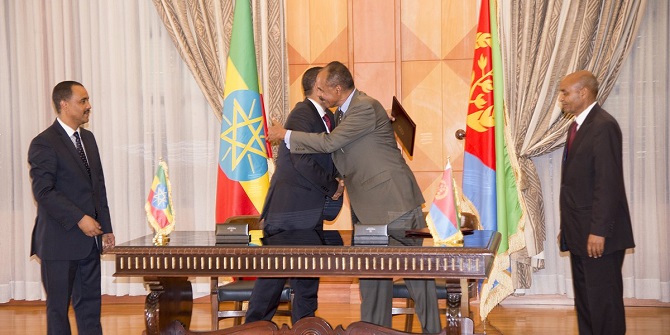Shérazade Gatfaoui argues that the crisis in Central African Republic is not just of national importance, but could have an impact on the sub-region.
Since the offensive (in December 2012), and Seleka’s subsequent seizure of power (in March 2013), the international community has had to intervene following the acts of violence of Seleka (alliances of predominantly Muslim rebels) and the Anti-Bakala (Christian militia) against populations. The interventions, which go as far as taking the form of a guardianship, aim to restore peace, guarantee security and ensure a political stabilization. Despite a certain lull, it is obvious that the interventions of the international community (SANGARIS, MISCA, EUFOR and MINUSCA), as deployed since the beginning of operations, are not sufficient to restore security and put an end to the violence.

The Central African Republic is experiencing the most serious crisis in all its history. According to Didier Niewiadowski, a former Counselor for Cooperation and Cultural Affairs at the French Embassy in Bangui: “the latest crisis cannot be seen as a new revolt that involves only the armed forces in the Central African Republic”. This crisis is both national and regional. It involves the Central African Republic and countries in the sub-region (Cameroon, Chad, Congo Brazzaville, Democratic Republic of Congo, Sudan). Consequently, the risks associated with the activities of transnational armed groups could jeopardize the balance of countries in the sub-region. It is also characterized by its inter-religious and inter-communal dimension. Following the overthrow of President François Bozizé by Seleka (in March 2013), Michel Djotodia became the first Muslim Head of State in a predominantly Christian country. Seleka’s acts of violence against Christian communities, then those of Anti-Balaka against Muslim communities, immediately plunged the country into a situation of terror. Faced with the seriousness of the situation, certain international observers and experts did not hesitate to qualify it as “ethnic cleansing”. While the objective of international action is to maintain the ceasefire between the belligerent parties, the challenge today goes beyond managing the inter-religious conflict and reconciliation between communities. It is above all a crisis of the political and judicial systems.
Persistent atmosphere of mistrust
The Central African Republic suffers from a persistent ill. Mistrust has become the distinctive marker of society in the Central African Republic. Since its independence, a whole host of revolts have contributed to establishing a culture of mistrust. This country has become marked by opportunist and deviant behavior. The evidence is overwhelming: anarchy, insecurity, disappearance of the rule of law, failure of the economy, impoverishment of the population, loss of a sense of the function of the State and politicians, and gradual deterioration of the national sentiment. The resulting crisis of trust, not to mention the lack of trust, may be considered as one of the main causes of conflict between communities. It is a major obstacle to the reconstruction of the Central African Republic. It is largely related to the continuous inadequacies of institutions, which are supposed to be the guarantor of trust. Finally, regional differences and the unclear distribution of tasks between actors in the management of the crisis exacerbate the feeling of mistrust among populations and the partners involved.
Read the full article on the Ideas for Development blog




